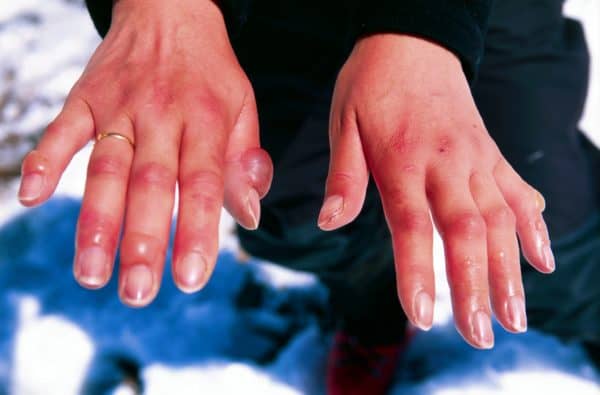Effective new treatment for frostbite developed at Yukon hospital

 A new treatment for frostbite comes from a drug called iloprost, a blood vessel dilator.
A new treatment for frostbite comes from a drug called iloprost, a blood vessel dilator.
Two years ago, a pair of ultra marathon runners, both in their 40s, arrived at Whitehorse General Hospital. They came separately, but both had severe frostbite as a result of the brutally cold temperatures (between -30 and -50 degrees Celsius) at that year’s Yukon Arctic Ultra race. One had been running for 27 hours in the 430-mile (692-km) version of the race and presented at the hospital with grade 3 frostbite on both hands, with hemorrhagic blistering, as well as on both feet and his nose. The other, who for 64 hours during the 100-mile (161-km) course, had grade 3 frostbite to both big toes.
Frostbite means the freezing of skin and bodily tissues, with the damage rated on a scale — first degree frostbite, or frost nip, means superficial skin damage that the body can repair in time on its own. Second degree frostbite freezes shows in the form of blisters and can result in permanent numbness or sensitivity of the affected area. Third degree means that the lower layers of tissue have frozen and tissue damage can result. And in fourth degree frostbite, the freezing reaches all the way down to the bone.
Current treatment for frostbite involves raising the core temperature along with rapid rewarming of the damaged skin. Thrombolytics, more commonly used to dissolve blood clots in the case of heart attack or stroke, can also be employed. The aim is to restore blood flow to the damaged tissues so as to prevent tissue death — gangrene, which can call for amputation.
But now, medical staff at Whitehorse General have shown success with another approach, one that adds to the mix a drug called iloprost, a blood vessel dilator, which, while available in Europe needed special permission from Health Canada to be approved for use in the researchers’ study.
“At the time, this approach was not well-known here, and the drug was not available for use in North America,” says Dr. Alex Poole, surgeon at Whitehorse General Hospital and co-author of a new study on the treatment. “We decided to work together to see what we could do to adopt this treatment method in the Yukon – and this started a series of discussions with Health Canada.”
And lucky for the two ultra runners, too, as both received the treatment involving iloprost, with both recovering from their injuries. At a six-month follow-up, neither patient had required amputation but both were reporting hypersensitivity in the affected areas.
The novel treatment approach, published in the Journal of the Canadian Medical Association, has been inquired about by other experts across the country, says Josianne Gauthier, pharmacist at Whitehorse General and study co-author. “We’ve had a lot of calls from other hospitals in Canada, inquiring about our protocol and how to get access to the drug,” says Gauthier, to CBC News.
So far, the new frostbite procedure has been in service at Whitehorse General for three years and used on eight patients. “This development has really put Yukon and WGH on the map,” said Gauthier. “Having this treatment method available close to home really benefits our hospital and patients, especially considering the cold climate we live in.”

